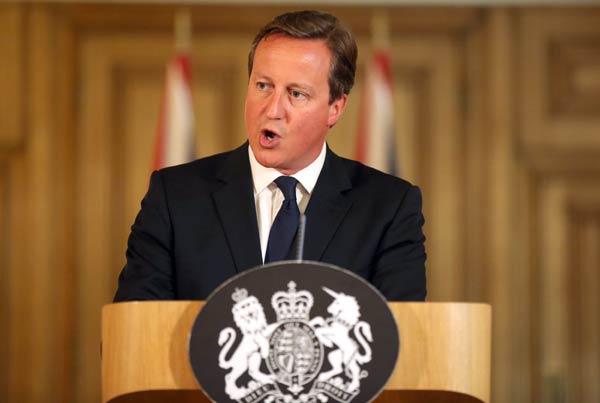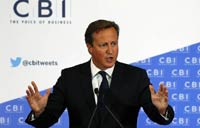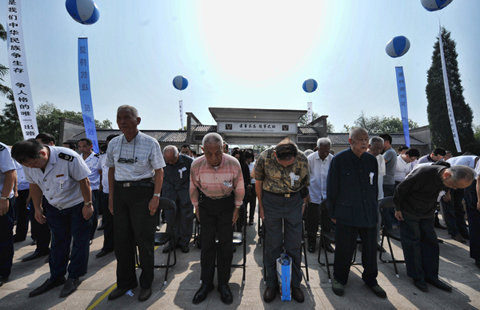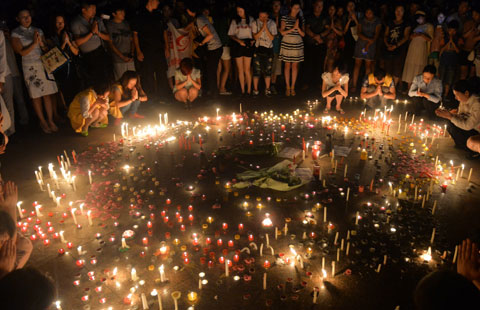Britain unveils new anti-terror measures
Updated: 2014-09-02 09:12
(Xinhua)
|
|||||||||||
 |
|
Britain's Prime Minister David Cameron speaks at a news conference in Downing Street, central London on August 29, 2014. [Photo/Agencies] |
|
 |
| British PM stresses advantages for Scotland to stay in Britain |
"To confront the threat of Islamist extremism, we need a tough, intelligent, patient and comprehensive approach to defeat the terrorist threat at source," Cameron told the British Parliament in an oral statement.
Commenting on the terrorist threat facing Britain, he said: "we have all been shocked and sickened by the barbarism that has been witnessed in Iraq this summer," including the beheading of American journalist James Foley "with the voice of what seems to be a British terrorist" recorded in a video.
He announced that Britain need to strengthen powers in two key areas to fill specific gaps in its anti-terror armory by "preventing suspects from traveling and dealing decisively with those already here who pose a risk."
"We will introduce specific and targeted legislation providing the police with a temporary power to seize a passport at the border, during which time they will be able to investigate the individual concerned," he said, stressing that "passports are not an automatic right."
To stop suspects from traveling, Britain "must also keep out foreign fighters who would pose a threat to the UK," the prime minister added.
He said that Britain has already had powers to deprive dual nationals of their citizenship to stop the fighters returning and bar foreign nationals on the basis of the threat they pose.
"We are clear in principle that what we need is a targeted, discretionary power to allow us to exclude British nationals from the UK," he noted.
The prime minister also underlined the need for stronger powers to "manage the risk posed by suspected extremists who are already in the United Kingdom."
"We will introduce new powers to add to our existing terrorism prevention and investigation measures, including stronger locational constraints on suspects under TPIMs (Terrorism Prevention and Investigation Measures), " he said.
Noting that Britain's new approach to tackling radicalization focuses on "all types of extremism," the prime minister said: "Anyone subject to our strengthened terrorism prevention and investigation measures will be required to engage with the Prevent program."
"Adhering to British values is not an option or a choice; it is a duty for all those who live in these islands. So we will stand up for our values; we will, in the end, defeat this extremism," he added.
Britain has also stepped up its operational response, with a fivefold increase in Syria-related arrests and the removal of 28, 000 pieces of "extremist material" from the internet this year alone, including 46 ISIL-related videos, according to his oral statement.
British Home Office on Friday announced to upgrade the country' s threat level from international terrorism from "substantial" to "severe."
The change meant that a terrorist attack is "highly likely," although there is no intelligence to suggest that one is imminent, according to the Home Office.
Britain will host this year's NATO summit in Wales on Thursday and Friday, with nearly 60 world leaders, 70 foreign ministers, 70 defense ministers and 28 NATO member countries invited.
Related Stories
PM: Ukraine wants to seek NATO membership 2014-08-30 08:07
Afghan president will not attend NATO summit 2014-08-27 15:26
Crisis reflects NATO's blindness to multipolar world 2014-08-07 07:00
Russia warns against military buildup by NATO 2014-06-10 07:30
NATO not among CSTO's immediate threats 2014-04-22 17:29
Putin makes overture to incoming NATO chief 2014-04-19 21:23
Today's Top News
China lays down plan for cross-border rail lines
China Mobile ringing up sales for iPhone 6
Global demand for Chinese literature sees a surge
South Korea regrets over laser pen incident
Celebrities' nude shots removed from some websites
Hotline helps nationals overseas
'Bad news' for pregnant giant panda
Vice-premier vows to advance modern Silk Road
Hot Topics
Lunar probe , China growth forecasts, Emission rules get tougher, China seen through 'colored lens', International board,
Editor's Picks

|

|

|

|

|

|





